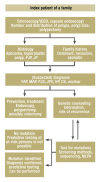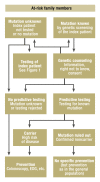The differential diagnosis and surveillance of hereditary gastrointestinal polyposis syndromes
- PMID: 20358032
- PMCID: PMC2847323
- DOI: 10.3238/arztebl.2010.0163
The differential diagnosis and surveillance of hereditary gastrointestinal polyposis syndromes
Abstract
Background: Hereditary gastrointestinal polyposis syndromes account for about 1% of all cases of colorectal cancer and are associated with a broad spectrum of extracolonic tumors. The early detection and accurate classification of these syndromes are essential, since effective methods for surveillance and treatment are available.
Methods: This review article is based on a selective literature search, the author's own work, and evidence-based guidelines and recommendations.
Results and conclusions: The diagnosis is initially suspected on the basis of the endoscopic findings and polyp histology. Because different syndromes can resemble each other phenotypically, e.g., autosomal dominant familial adenomatous polyposis and autosomal recessive MUTYH-associated polyposis, molecular genetic studies are important for differential diagnosis and for assessing the risk of recurrence. Identification of the familial mutation in an affected patient is a prerequisite for predictive testing in asymptomatic persons at risk and sometimes enables prognostication. In recent years, the rate of detection of mutations has risen by 10% to 30%, and clinically relevant genotype-phenotype correlations have been described for juvenile polyposis syndrome. Except in cases of mild adenomatous polyposis, phenotypic overlap among the hamartomatous polyposes often causes difficulties in differential diagnosis. Thus, in unclear cases, a pathologist with special expertise in gastrointestinal disorders should be consulted for the evaluation of polyp tissue. Aside from the monogenic polyposes, there are many other types of polyposis that are non-hereditary or of unknown cause, including the hyperplastic and mixed polyposis syndromes. Risk-adapted surveillance programs have been established for the more frequently occurring polyposes.
Figures




References
-
- Schulmann K, Pox C, Tannapfel A, Schmiegel W. The patient with multiple intestinal polyps. Best Pract Res Clin Gastroenterol. 2007;21:409–426. - PubMed
-
- Bronner MP. Gastrointestinal polyposis syndromes. Am J Med Genet A. 2003;122A:335–341. - PubMed
-
- Friedl W, Kruse R, Jungck M, et al. Hamartomatöse Polyposis-Syndrome. Dtsch Arztebl. 1999;96:A 2285–A 2291.
-
- Zbuk KM, Eng C. Hamartomatous polyposis syndromes. Nat Clin Pract Gastroenterol Hepatol. 2007;4:492–502. - PubMed
-
- Jass JR. Colorectal polyposes: from phenotype to diagnosis. Pathol Res Pract. 2008;204:431–447. - PubMed
Publication types
MeSH terms
LinkOut - more resources
Full Text Sources
Research Materials

